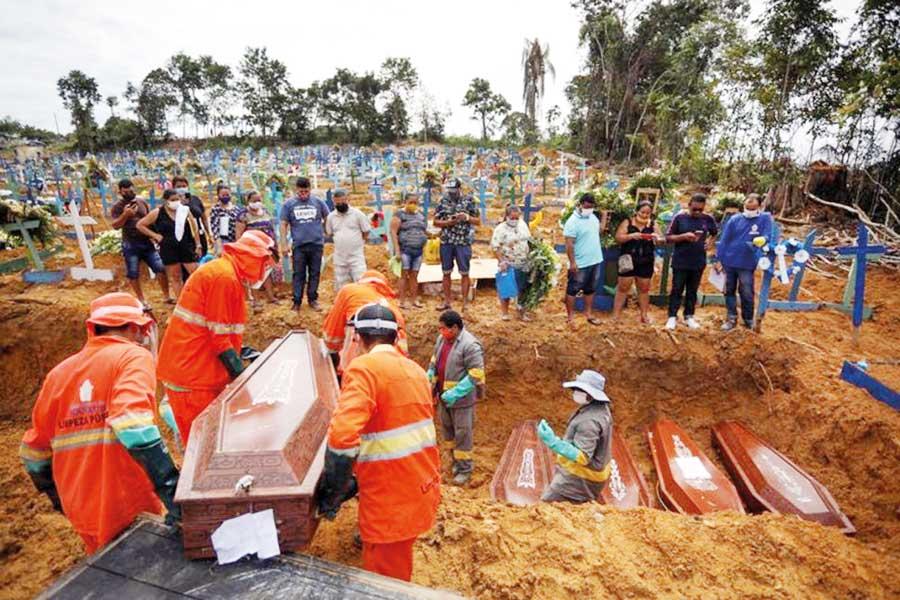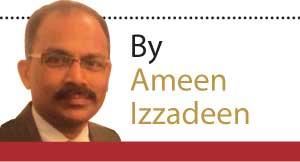04 Dec 2020 - {{hitsCtrl.values.hits}}

Gravediggers carry a coffin during a collective burial of people who died due to COVID-19, at a cemetery in Brazil. Reuters
When Muslims were a minority in the city state of Mecca in the early 7th century AD, they faced persecution,  including torture, economic boycott and social ostracism. When they could bear no more hardship, Quranic verses were revealed to the Prophet Muhammad, urging the Muslims to exercise ‘beautiful patience’ (Sabran Jameelan). The prophet also received revelation that informed him of earlier people who went through crises worse than what the Meccan Muslims were going through. One such story is explained in Chapter 85 (Surah Buruj).
including torture, economic boycott and social ostracism. When they could bear no more hardship, Quranic verses were revealed to the Prophet Muhammad, urging the Muslims to exercise ‘beautiful patience’ (Sabran Jameelan). The prophet also received revelation that informed him of earlier people who went through crises worse than what the Meccan Muslims were going through. One such story is explained in Chapter 85 (Surah Buruj).
According to Quran scholars, the story was about how a Yemeni king persecuted the country’s Christian minority who refused to abandon monotheism and believe in the king’s religion of sorcery. To punish the Christians, the king made a trench of fire and gave them the option of saving themselves from death by fire if they accepted the king’s religion. The Quran says the people were thrown into the fire, for believing in God.
The Quranic chapter should come as a consolation to Sri Lanka’s Muslims who are deeply disturbed by the cremation of Muslims who die of COVID-19 -- more so, after the Supreme Court (SC) on Tuesday rejected a fundamental rights petition against the Government circular that made cremation mandatory for those who die of COVID-19.
The SC decision is not the last nail in the coffin. There is still space to work out a compromise if the Muslims could handle the issue with the sensitivity it requires. The Muslims can take comfort in the fact that the government has not rejected their plea. It only says an experts committee has been studying the issue and until it gives its recommendations, cremation will be the only solution. However, this committee is shrouded in much secrecy, as pointed out by Opposition Leader Sajith Premadasa in Parliament this week. The Health Ministry’s position is that not much is known about the new coronavirus and therefore, it cannot take a risk.
However, the Muslims insist that all what is required is to arrange an online discussion with World Health Organization experts and virologists known for their intellectual honesty to clear doubts about safety issues arising from the burial of COVID victims.
It was unfortunate that the SC saw no merit in the petition filed on the basis that forced-cremation is a violation of fundamental rights guaranteed under the Constitution. The ruling came days after the Human Rights Commission of Sri Lanka issued a statement in favour of burial.
The bigger issue is whether the government has the right over an individual’s body
The social contract theories are built on the assumption that the state was formed with individuals surrendering not all of their rights but some of their rights to the state so that society could move from chaos to order. In this process, an authoritarian state emerges when we give up more of our rights, a weak state when we give up a few of our rights and a progressive state when the right balance is struck. The right to bury, cremate or donate the body of a loved one was not handed over to the state and, therefore, it has remained a fundamental right.
The slogan ‘my body my choice’ is a powerful human rights statement widely used by feminists and LGBTQ+ community to challenge political and cultural obstacles and biases in society. The statement has found legal currency in progressive states.
In the same vein, human rights activists believe the choice to be buried or cremated is not for governments to decide, unless it is scientifically established that burial is harmful to living beings.
In April this year, in a landmark judgment, the Tamil Nadu High Court observed that the fundamental right to life guaranteed under the Indian Constitution includes the right to decent burial or cremation. The court gave this ruling in a public interest petition filed in the face protests against the burial of the body of a doctor who had died due to COVID-19. The court warned protesters that they faced arrests if they raised objections to the disposal of the bodies of those who had died due to COVID-19.
The doctor’s family wanted burial. The court saw no harm in burial if the Health Ministry guidelines were followed. In a similar case in May, the Mumbai High Court gave a ruling on the basis there is no scientific data to support the claim that COVID-19 spreads through the burial of bodies.
If there is indeed scientific evidence supported by international peer review that the burial of COVID victims poses danger, then the government’s decision to cremate the bodies is in order. But there is no such evidence. The Muslims are convinced that no danger is posed to society in burying COVID victims because such burials are happening in more than 185 countries, including those nations which share hydrological similarities with Sri Lanka.
Addressing the media in the aftermath of the SC verdict, a cremation lobby lawyer said Muslim extremists could use the bodies of COVID victims to commit bio terrorism.
If the Government believes such asinine and hypothetical arguments and rejects the WHO’s advice and scientific evidence in support of burial, its stance will only retard its efforts to walk tall once again among the community of democratic and progressive nations.
As the stalemate drags on, some Muslims have resolved not to give their consent to cremate their loved ones who die of COVID-19 and not to accept the ashes. This is not only because they are asked to pay Rs. 58,000 as coffin and cremation costs – which many poor families could ill afford -- but also because their conviction that they should not pay to be part of what they see as a preposterous, irrational and sinful act. The government this week decided to cremate several bodies unclaimed by relatives.
In the meantime, the burial dispute exposes structural weaknesses in the Muslim community. The so-called leaders, both religious and political, have failed the community. From within the Muslim community, voices are being heard that the main religious body, the All Ceylon Jamiyyathul Ulama, should dissolve itself or act only as a moulavi trade union as had been the case decades ago. For it has, for far too long, arrogated to itself the authority to decide on behalf of the Sri Lankan Muslims only to make matters worse.
Although there is no priesthood in Islam, the ACJU seems to have created a moulavi institution similar to Brahmanism. To lead the community, there are plenty of Muslim scholars who do not carry moulavi titles but are more qualified to interpret the Quran from a liberative perspective.
Most Muslim political leaders, on the other hand, appear to be more interested in safeguarding their positions and political perks than serving the interests of the community. Forming communal political parties was the beginning of their series of mistakes that, apart from alienating the Muslims from the mainstream, have led to communal hatred and terrorism that exploded on Easter Sunday last year.
Time is now to dissolve communal political parties and for Muslim politicians to be part of national political parties such as the Sri Lanka Podujana Peramuna, the Samagi Jana Balawegaya and the Janatha Vimukthi Peramuna if they are seriously concerned about the welfare of the Muslim community. Trust in God and social integration with fellow citizens are the way forward to solve problems such as burial of COVID victims.
30 Nov 2024 1 hours ago
30 Nov 2024 4 hours ago
30 Nov 2024 6 hours ago
30 Nov 2024 7 hours ago
29 Nov 2024 29 Nov 2024